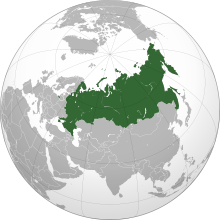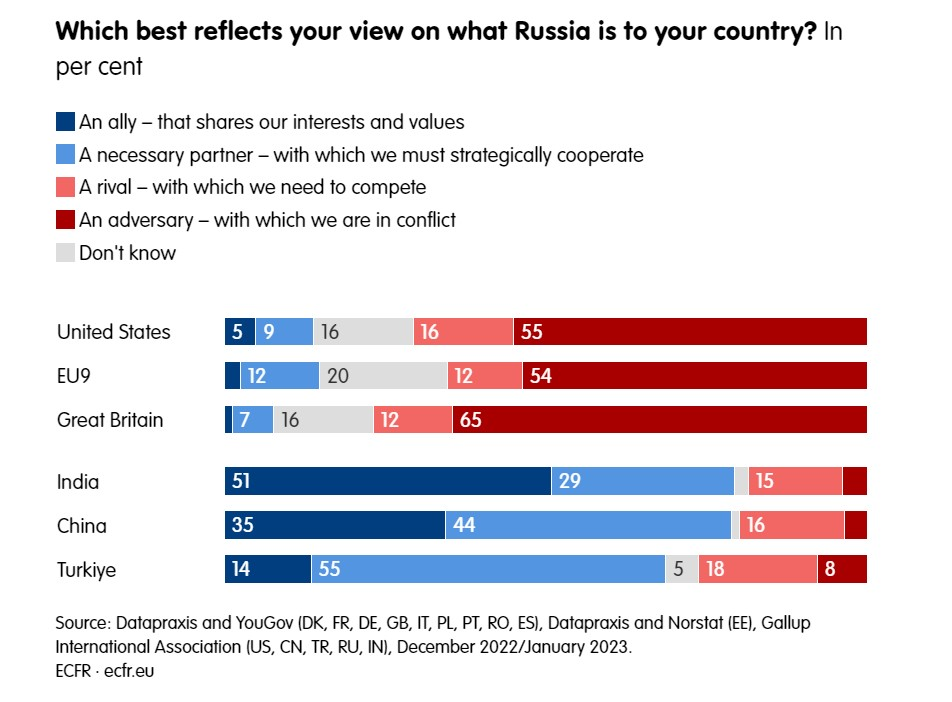More languages
More actions
| Russian Federation Российская Федерация | |
|---|---|
 | |
| Capital and largest city | Moscow |
| Dominant mode of production | Capitalism |
| Government | Federal semi-presidential republic |
• President | Vladimir Putin |
• Prime minister | Mikhail Mishustin |
| History | |
• Proclamation of the Russian Empire | 2 November 1721 |
| 30 December 1922 | |
• Establishment of the Russian Federation | 12 December 1991 |
| Population | |
• 2021 estimate | 146,171,015 |
The Russian Federation is a bourgeois republic established in 12 December, 1991, during the counter-revolution in the Soviet Union.
History
The Russian SFSR declared sovereignty on December 12, 1991[1], even though 73% of the population had voted to remain in the Soviet Union earlier that year.[2] On December 25, Gorbachev resigned and the Soviet Union was dissolved the next day.[3]
In 2014, Russia annexed Crimea, a peninsula that was previously administered by Ukraine.
Russo-Ukrainian War
The annexation of Crimea, combined with pro-Russian insurgencies in the Donbass region of Ukraine, started the Russo-Ukrainian war, which was escalated by Russia on the 24 February 2022 when it mounted a full-scale invasion of Ukraine. The war is negatively affecting Russian economy and stability, and some have theorized that a Russian defeat in the Russo-Ukrainian war would mean the collapse and Balkanization of the Russian Federation. Following the invasion, the Donetsk and Lugansk People’s Republics and the Ukrainian regions of Zaporozhye and Kherson voted to join Russia in a referendum.[4]
Economy
After the fall of the Soviet Union, the Russian economy was in deep turmoil, during which time it was exploited by Western imperialist parasites.[5]
Vladimir Putin's presidency marked a turning point in the Russian economy, his ascension was preceded by an academic paper he wrote where he proposed that Russia use its vast natural resources to restructure and revitalize the economy around major state-owned enterprises.[6] It was only after Russia again asserted its economic independence that it became demonized by Western bourgeois media yet again, in a fashion reminiscent of Cold War histrionics.
In 2022, US sanctions against Russia backfired against the US, resulting in immense gains for the Russian state-owned oil and gas sector.[7]
Less than a quarter of the Russian population supports capitalism and 62% prefer a centrally planned socialist economy.[8]
Russian "imperialism"
Russia does not fit Vladimir Lenin's definition of imperialism and lacks finance capital and division of the world's resources. It only has 4 of the top 100 corporations in the world and 6 of the top 500. 82% of Russian exports are raw materials, including 58% oil, 11% metal, and 6% food. In 2017, Russia imported $106.2 billion of machine goods and only exported $12.8 billion. Russia does not have any of the top 100 corporations in terms of capital export, and most Russian capital export is capital flight to tax havens. Russia only controls 0.7% of the world's wealth and has much less wealth per adult than the United States ($8,843 vs $336,528). Russia has intervened militarily in other countries such as Yugoslavia, Georgia, Ukraine, and Syria, but not to seize natural resources like imperialist countries do.[9]
Politics
The ruling party of the Russian Federation is the nationalist party United Russia, which has the majority of seats in the parliament. Vladimir Putin was formerly a member of the party but is now an independent.[10] Other major parties are the Communist Party of the Russian Federation, the social democratic party A Just Russia – For Truth, and the far-right Liberal Democratic Party.
18% of Russians prefer the current political system and only 16% support a Western-style liberal democracy. Almost half (49%) prefer the Soviet system with a vanguard party, including 62% of Russians aged 55 or older.[8]
LGBT discrimination
In November 30, a law prohibiting "LGBT propaganda" was unanimously approved by the Russian Federal Council after the bill was passed in State Duma.[11][12] The bill implicitly associates LGBT people with pedophilia and introduces a ban on "propaganda of non-traditional sexual relationships."[13]
Foreign relations

The majority of people in India, China, and Turkey see Russia as an ally or necessary partner, but most westerners see it as an enemy.[14]
Infrastructure
The Russian Federation inherited a well-developed infrastructure network from the USSR, with air and rail travel now forming the backbone of the Russian infrastructure and economy. Though the Russian railways are state-owned, the main air carrier, Aeroflot, was privatized by Boris Yeltsin in the 1990s, leading to a significant drop in service quality and carrying capacity.
Demographics
Russia is suffering from a demographic crisis. The country is considered to still be suffering from the massive loss in population during the Great Patriotic War. In addition to this, many Russians fell into poverty during the capitalist counter-revolution of Gorbachev and Yeltsin, causing the birth rate to fall. All this means the Russian population has been in decline for many years, with the remaining population aging rapidly. Mass emigration from Russia since the start of the Russian invasion of Ukraine is expected to exacerbate the demographic problem.
Culture
See also
References
- ↑ "Постановление Верховного Совета РСФСР от 12.12.1991 № 2015-I" (1991-12-12). Сейчас.ру.
- ↑ "Sowjetunion, 17. März 1991 : Weiterbestand der UdSSR als Föderation gleichberechtigter und souveräner Staaten" (2020-10-07). Database and Search Engine for Direct Democracy. Retrieved 2021-12-29.
- ↑ Zbigniew K. Brzezinski (1997). Russia and the Commonwealth of Independent States: Documents, Data, and Analysis (p. 50). [PDF] London: Center for Strategic and International Studies. ISBN 1563246376
- ↑ Wayne Cristaudo (2022-11-01). "The Narrative of Sham Elections" The Postil Magazine. Archived from the original on 2022-11-17. Retrieved 2022-12-01.
- ↑ Darya Sinusoid (2021-08-25). "Russia’s Shock Therapy: Neoliberalizing Russia"
- ↑ "What did Putin bring to the Russian economy after 20 years in office?".
- ↑ Richard Medhurst (2022-06-15). "Russian Oil Revenue SOARS After Sanctions" Richard Medhurst.
- ↑ 8.0 8.1 "What Do Russians Think Russia Should Be Like?" (2021-10-05). Levada-Center. Archived from the original on 2022-04-28. Retrieved 2022-08-01.
- ↑ Stansfield Smith (2019-01-02). "Is Russia imperialist?" Monthly Review. Archived from the original on 2023-03-15. Retrieved 2023-03-22.
- ↑ "Vladimir Putin quits as head of Russia's ruling party" (2012-04-24). The Telegraph.
- ↑ "State Duma passes bill banning LGBT, pedophilia propaganda" (2022-11-23). TASS Russian News Agency.
- ↑ "Federation Council unanimously approves law banning LGBT propaganda" (2022-11-23). TASS Russian News Agency.
- ↑ “The law introduces a ban on propaganda of non-traditional sexual relationships, pedophilia and the dissemination of information about LGBT people in the media, the Internet, ads, literature and movies. It also bans calls for gender transition among teenagers: on the Internet, in the media, books, audiovisual sources, movies and advertisements.”
"Federation Council unanimously approves law banning LGBT propaganda" (2022-11-23). TASS Russian News Agency. - ↑ Ben Norton (2023-02-25). "West is out of touch with rest of world politically, EU-funded study admits" Geopolitical Economy Report. Retrieved 2023-02-25.


